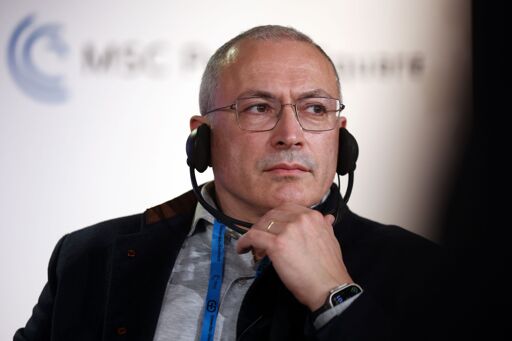Russia’s Federal Security Service (FSB) has charged exiled opposition leader Mikhail Khodorkovsky and 22 members of the Russian Anti-War Committee with “violent seizure of power” and “organizing or participating in a terrorist community,” the service announced on Oct. 14.
The Russian Anti-War Committee, founded shortly after Russia launched its all-out invasion in February 2022, describes itself as a platform supporting “anti-war Russians” and promoting “solidarity, action, and mutual aid for people who oppose the war unleashed by the Kremlin.”
According to the FSB, the committee’s goal is the “violent seizure of power” and the “change of the constitutional order.” All 23 members have been listed as defendants in a criminal case.
Those charged include prominent figures such as chess grandmaster and political activist Garry Kasparov, opposition figure and journalist Vladimir Kara-Murza, political scientist Ekaterina Schulmann, and former lawmaker Dmitry Gudkov.
The FSB also accused the group of allegedly financing “Ukrainian paramilitary units” and recruiting fighters for them — but it did not provide any evidence to support these claims.
Khodorkovsky, once Russia’s richest man, faces an additional charge of “incitement to terrorism.”
Russian investigators cited the committee’s 2023 Berlin Declaration, which called Russian President Vladimir Putin’s regime and the war against Ukraine “criminal,” as the basis for prosecution.
The FSB said the declaration’s wording signaled a call for “the elimination of the Russian government.”
The agency also claimed that the opposition platform recently created at the Parliamentary Assembly of the Council of Europe (PACE) was “positioned by Khodorkovsky as a ‘constituent assembly of the transition period’ and an alternative to the Russian authorities.”
PACE on Oct. 2 approved a resolution to establish a “platform for dialogue with Russian democratic forces,” enabling exiled opposition figures to participate in preparing reports and policy recommendations on sanctions and human rights.
The charges against Khodorkovsky and other anti-war figures highlight the Kremlin’s escalating repression of opposition movements at home and abroad.
Since 2022, Russian authorities have intensified efforts to silence critics, designating dozens of independent media outlets and activist groups as “foreign agents” or “undesirable organizations,” effectively banning their activities and criminalizing cooperation with them.
Amnesty International reported that more than 21,000 people were penalized in Russia in 2022 alone for criticizing the war or disseminating information deemed “false” by the state.
Read also: Trump’s two wars: why diplomacy worked in Gaza but not in Ukraine
From The Kyiv Independent - News from Ukraine, Eastern Europe via this RSS feed


